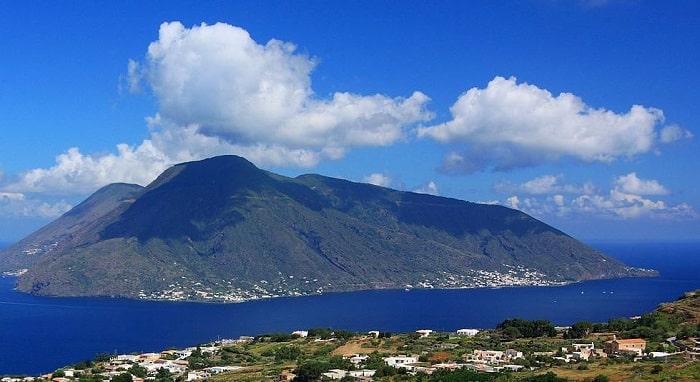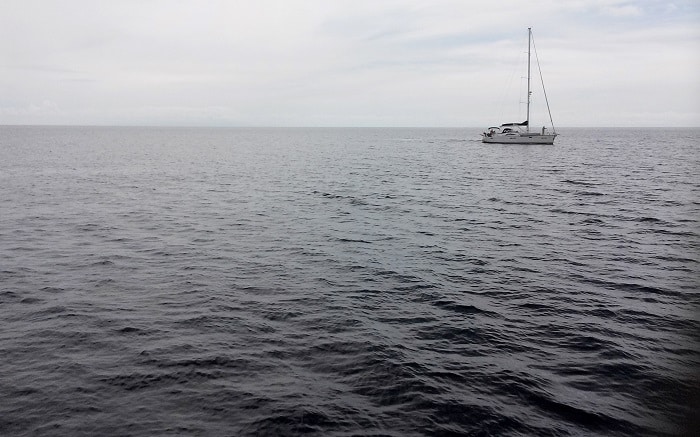Few weeks back, I climbed an erupting volcano.
Whilst I was sheltering from the rain in a local bank someone told me that I should wear long socks to avoid the volcanic sand. Volcanoes are nothing new to Aeolian Islanders: with the active volcanic islands of Vulcano and Stromboli both close, plumes of smoke are part of everyday life. More worrying to them was the light rain, which was apparently distressing and unusual.
The Aeolian Islands are a small group of volcanic islands situated in the Tyrrhenian Sea, north of Sicily, that have been populated since the Bronze Age. They are famous for good food and beautiful views and are popular among Italian tourists. Their appearance is very typically Mediterranean, with small villages of white, square houses between rocky Mountains and a shimmering blue sea. However, the first feature I noticed was the wind, which is surprisingly cold and biting. Somehow, the tourist pictures do not capture that aspect of the islands.
It is easy to believe that the Greek god of the winds, Aeolus, lives somewhere around the islands, closeted away inside his mountain hideout and whipping the winds into a fury (or so Virgil tells us). I like to imagine that he lives in Panarea, and the jet setting celebrities like Tom Cruise that have been known to visit are oblivious to the stormy deity whose land they are besmirching with their parties.
I headed, however, to Salina. Salina is the greenest and tallest of the islands, with twin mountains of almost a thousand meters that look like something out of Jurassic Park. The island is known for the production of capers and an excellent, sweet desert wine called ‘Malvasia’. In July and August, Salina is overrun with tourists of all varieties, from those that want to climb Mountains and swim in the warm sea to those that just want to try the local Malvasia.

Life seems ordinary here. The islanders’ lives are typical of any southern Italian village, drinking coffee in bars and taking long siestas at lunchtime. The conversations I heard seemed to ignore the yearly influx of tourists, even in regard to the economy. It stands in sharp contrast to self-aware places like Florence or Venice, where the locals’ lives are shaped by the tourist industry. The Aeolian Islands have stunning black sand beaches and tall, rocky mountains, yet outside tourist season there is no hint that the islanders know they live in such a paradise.
Perhaps this very normal life could be attributed to the closeness of the community. Every chance meeting of islanders appeared to be a reunion of long-lost friends. The small communities do mean that most people know each other. I asked a man mooring a boat about getting a job. “If there is a job you would really want,” the man informed me in Italian from behind shiny Ray Bans, a bleached cap and a thick beard, “I know the right people. Just ask me.” He did know the right people: he wasted no time in taking me to see the proprietor of a local restaurant, who sat at a table with a local newspaper whilst watching the sea.
The meeting felt more like a plea to Don Corleone, the Mafia boss in The Godfather, than a job interview. The restaurant patron had a thick moustache, a few thick gold rings and greying, combed-back hair. He was lounging back on a chair in a white suit, listening closely and responding with laconic Italian addressed not to me, but to the bearded boat moorer. He let me talk to him in nervous Italian, studying me intently. At one point, he paused me and turned to a couple of American tourists that had just walked in. “You are the most beautiful people I have ever seen,” he told them in heavily accented Italian. His persona had a Sicilian drawl and a roguish smile, but I suspect that behind the bravado was a very clever, calculating man who knew how American tourists liked to be greeted.

When I had finished speaking, he called for a business card and wrote his name and number on it. He told me to call him. That was it; we said our thanks and left. The bearded man paused to talk to me outside. He explained that the man I had talked to owned several bars and restaurants in the area, which did not surprise me. He followed by talking to me about the job market, and how he would help me if he could. Behind the Ray Bans and bleached cap, I could tell he genuinely wanted the best for me, out of some innate good will towards a lone traveler who spoke a little Italian. Such an encounter seemed very typical of Salina, a place where everyone knows everyone to the extent that if you ask a random person mooring a boat about a job they will take you to an influential person who owns much of the business in Salina.
The good-natured helpfulness of the man with the Ray Bans also seemed to reflect the general friendliness of people in Salina. Their good disposition is not restricted to locals: even tourists like myself receive smiles or a ‘buongiorno’ when walking around. I asked an old lady where to find a shop, and after she had pointed me to the nearest Conad (a small supermarket common to mainland Europe) she walked with me half the way back to my house, talking to me cheerfully about life in Salina. There is an innocent charm about Malfa, as if it forgets for ten months that tourists exist and instead functions like any other sunny, accommodating Italian village.
On Salina, there are beautiful mountains, seas and Nectar-like desert wine. It is the community, however, that make it an unforgettable island. If Aeolus truly lives among the islands, I imagine he prefers spending his time drinking coffee and Malvasia to whipping up squalls.

